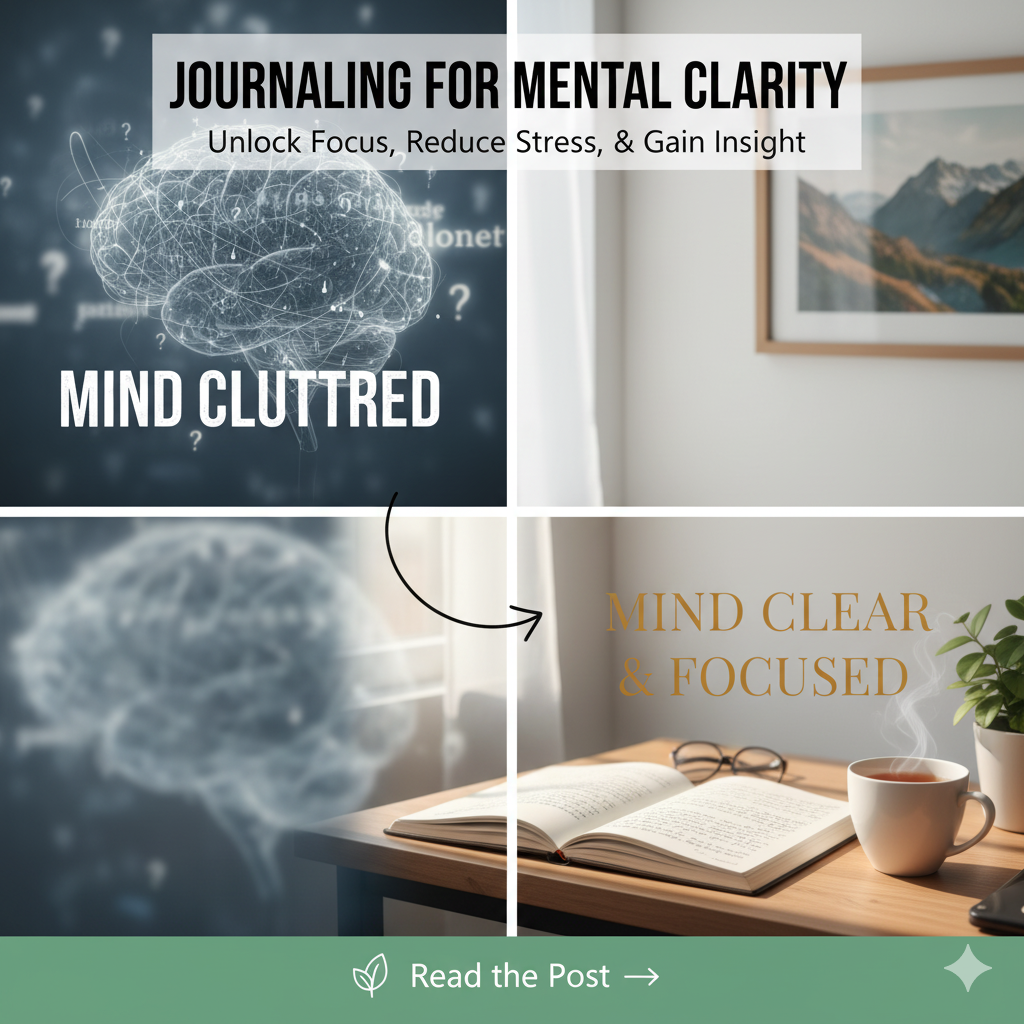5 Ways Journaling Boosts Mental Clarity
Table of Contents
5 Ways Journaling Boosts Mental Clarity
Meta Description:
Discover 5 powerful ways how journaling improves mental clarity. Boost focus, reduce stress, and gain insight with simple daily writing habits.
Introduction
Your mind feels cluttered. Tasks, worries, and ideas swirl around, making it hard to focus. What if there was a simple, low-cost way to clear mental fog and feel more focused every day?
That’s where journaling comes in. In this post, you’ll learn how journaling improves mental clarity and why it’s one of the easiest tools for self-reflection, stress relief, and sharper thinking.

Why Journaling Boosts Mental Clarity
Journaling is more than just writing in a notebook. It’s a mindful practice that helps you process emotions, organize thoughts, and see patterns clearly. Regular journaling can:
- Reduce stress and anxiety
- Increase self-awareness
- Improve decision-making
- Enhance creativity and focus
5 Powerful Ways How Journaling Improves Mental Clarity
1. Brain Dump to Clear Mental Clutter
- Write down everything on your mind — tasks, worries, random thoughts.
- Helps release mental tension and free up cognitive space.
Tip: Set a timer for 5–10 minutes and write without editing.
2. Gratitude Journaling to Shift Perspective
- List 3 things you’re grateful for each day.
- Reduces negative thinking and promotes a positive mindset.
Benefit: Builds emotional resilience over time.
3. Goal Tracking for Better Focus
| Goal Type | Example | Tracking Method |
|---|---|---|
| Personal Growth | Meditate 10 mins/day | Checkmark in journal |
| Professional | Complete project milestones | Weekly progress notes |
| Health | Walk 5,000 steps daily | Daily log |
Writing down and reviewing goals keeps you focused and motivated.
4. Reflective Journaling for Self-Insight
- At the end of the day, reflect on what went well and what can improve.
- Increases self-awareness and identifies mental triggers.
Tip: Use prompts like “Today I felt…” or “One lesson I learned today…”
5. Creative Journaling to Spark Ideas
- Doodle, mind-map, or free-write on topics you’re curious about.
- Helps unlock fresh ideas and solve problems faster.
Benefit: Engages both analytical and creative thinking.
How to Start Journaling for Mental Clarity
- Choose a format you enjoy — notebook, app, or digital document.
- Write at the same time each day for consistency.
- Don’t worry about grammar; focus on expressing thoughts freely.
Key Takeaways
- Journaling clears mental clutter and improves focus.
- Different styles — gratitude, reflective, goal tracking — address different needs.
- Consistency matters more than duration or format.
Conclusion
Journaling is a powerful yet simple tool to sharpen your mind, reduce stress, and enhance self-awareness. By practicing these 5 ways how journaling improves mental clarity, you’ll create space in your mind for what truly matters.
💡 What’s your favorite journaling style? Share your experience in the comments below!
FAQ – How Journaling Improves Mental Clarity
1. How often should I journal for mental clarity?
Daily or a few times per week works best for building the habit and seeing results.
2. Can journaling help with stress and anxiety?
Yes. Writing down thoughts helps process emotions and reduce stress naturally.
3. Do I need to write a lot for journaling to work?
No. Even 5–10 minutes of journaling can provide mental relief and clarity.
4. What’s the best time of day to journal?
Morning journaling helps plan your day; evening journaling helps reflect and unwind.
5. Can digital journaling be as effective as handwriting?
Yes. The key is consistency and honesty, whether on paper or digitally.






